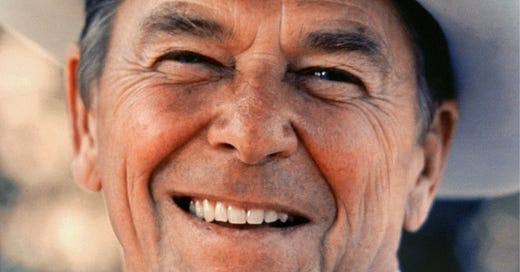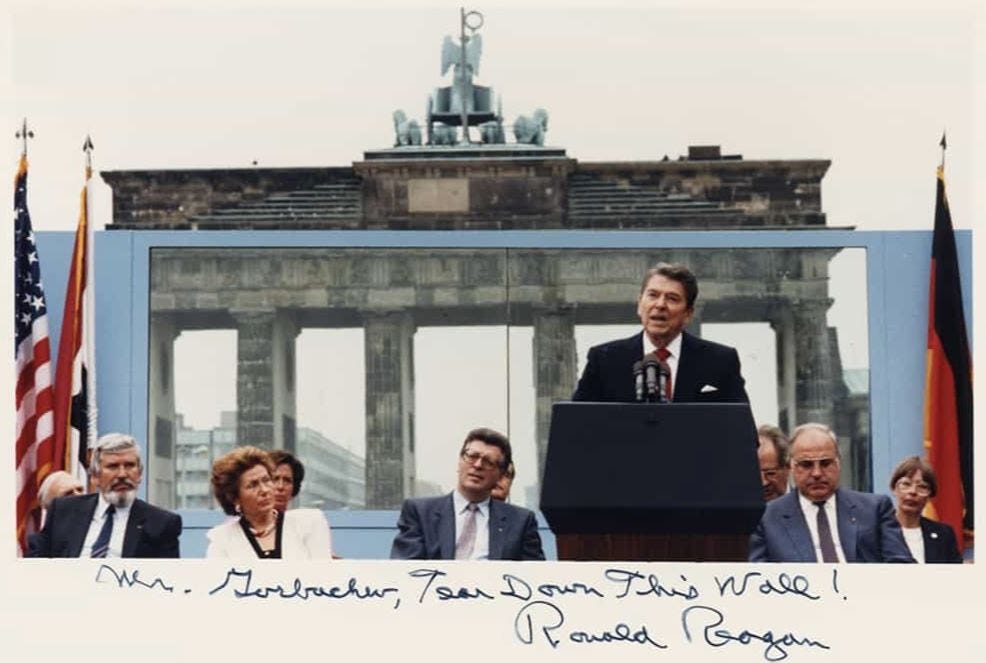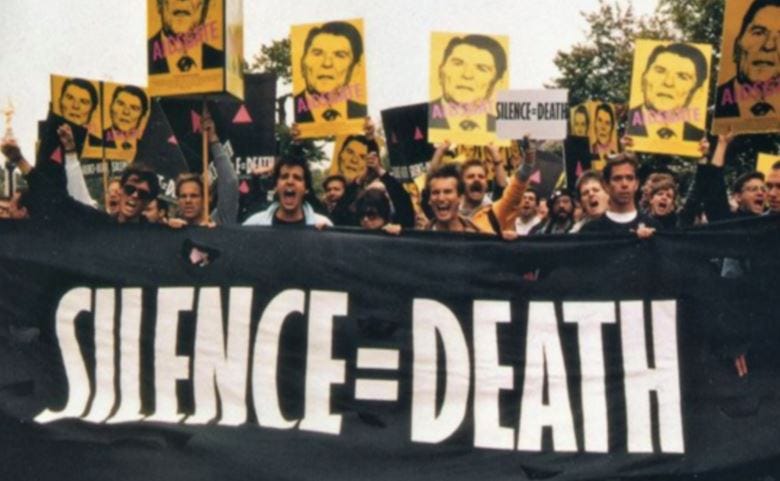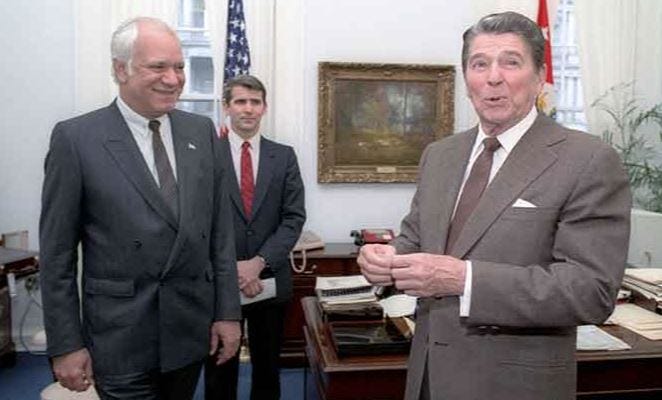Click here to go to Jimmy Carter.
It’s important to know that Ronald Regan was a Hollywood actor. He came to the presidency with the perquisite skill to morph into who the camera needed him to be.
In the 1950’s he used his skills and all-American persona to transition from acting to become the face of General Electric, one of the largest corporations at the time. At GE, powerful and wealthy backers marked Reagan as a person people liked and trusted. They saw that he could sell their ideas to the masses.
After two terms as governor of California, in 1980 they slapped a cowboy hat on the man and Regan promised to make America great again - a familiar phrase today that originated with Reagan’s ‘80 campaign. Then and now, this vague slogan calls to a nostalgic past that is unique to the imagination of each beholder.
In addition to sabotaging the hostage negotiations in Iran as detailed in the Jimmy Carter page, Reagan’s campaign team continued Nixon’s Southern Strategy by using covert language to court white voters and flip the South Republican. The vile and divisive theories behind racist, dog whistle language like “states rights” is explained clearly by Reagan advisor Lee Atwater here.
Following the three consecutive presidents of the 1970’s who inspired no political joy, Reagan won in an electoral landslide, though he captured only 51% of the popular vote.
Examining Reagan’s presidency, one has to measure the reality of his two terms verses the myth of the so-called Regan Revolution. Part of the myth is that cutting taxes increases government revenue because when corporations and high-income earners keep more of their money, more money trickles down to the middle class. Regan’s primary opponent and future running mate George Bush called bullshit when he labeled that notion “voodoo economics”.
Testing the idea, Reagan got taxes lowered in 1981, but unemployment went up to 10% and there was a recession in 1982. The federal deficit increased, and Reagan worked with Democrats and signed a tax increase into law to curb the deficit which increased on his watch.
The Reagan mythmakers don’t ever mention he raised taxes. And the myth that lowering taxes raises revenue persists today.
Reagan invoked distrust of the very government he led with his famous words:
“The nine most terrifying words in the English language are: I’m from the government and I’m here to help.”
-Ronald Reagan
Yet the federal government grew under Ronald Reagan, adding over 200,000 employees and expanding social security and Medicare. In the eight years of Reagan, $1.4 trillion was added to the national debt.
The myth of Reagan is that he was a small government tax cutter. The truth is that starting in the 1980’s the wealth inequality gap between the top 1% and the rest of us has grown and grown, shrinking the middle class. If Reagan started a Revolution, economically it’s hurt a lot more people than its helped.
That Republicans continue to use the Reagan myth to push unpopular ideas like cutting social security calls to mind the words of another former president:
“The great enemy of truth is very often not the lie – deliberate, contrived, and dishonest, but the myth – persistent, persuasive, and unrealistic. Belief in myths allows the comfort of opinion without the discomfort of thought.”
John F. Kennedy
As a child in the 1980’s, I liked Ronald Reagan. He was self-effacing and his folksy demeanor was comforting. That was the power of Ronald Reagan.
Reagan was all the more likable because of his wife Nancy. A former actress, the Reagans were a loving couple, America’s grandparents who still worked. Nancy had a huge amount of influence on the president.
She was a driving force behind the positive vibes of the 1984 campaign, promising Morning in America. But in the first debate with former Carter vice president Walter Mondale, the seventy-three-year-old Regan was befuddled at times which raised questions about his fitness for office. Now we know Regan was experiencing the early stages of Alzheimer’s disease but just as we see today, our septuagenarian politicians don’t give up power easily.
In the second debate, when asked if his age was an issue, Regan was ready with this comeback:
“I am not going to exploit for political purposes my opponent’s youth and inexperience.”
-Ronald Reagan
It was a great line, delivered by a pro. It was so great that Mondale laughed along with Reagan and the rest of us, and two weeks later Reagan crushed him in a landslide to win a second term. Until Joe Biden was elected thirty-six years later, Reagan was the oldest president in history.
Part of why Reagan grew the deficit was that he increased spending on the military. His infamous Star Wars project made companies billions but never did shoot a nuclear warhead from space. Whereas his predecessors tried to ease tensions with the Soviet Union, Regan was more aggressive, calling them the “evil empire”.
1980’s Americans feared nuclear war more than ever before. The world got lucky when Mikail Gorbachev became leader and reached out to the United States. Reagan wisely worked with him to reduce nuclear weapons but watching Regan fumble through his index cards during the talks, Gorbachev feared Reagan was just a mouthpiece for the US military-industrial complex. Reagan’s refusal to let go of Star Wars shattered the prospect of total nuclear disarmament.
In Berlin in 1987, Reagan delivered his most famous line as the leading man, “Mr. Gorbachev, tear down this wall!” Watching it still sends shivers up my spine. And two years later when the wall came down, it’s hard not to give Reagan credit.
The myth is that Reagan single handedly took down the Soviet Union. The truth is that the Soviet Union’s failed economic system and paper empire was crumbling with or without us, which is why Gorbachev was so desperate to establish relations with their old WWII ally.
Any US president has thousands of decisions to make. He’s also responsible for thousands of employees in the Executive branch who each make thousands of decisions themselves. From the start, Reagan was given cue cards to read at meetings and in front of the media. The people in his administration handled a lot. That’s of course true for any president, but Reagan was exceptionally unaware at times.
Nancy whispered in his ear a lot, as does any wife who’s watching the mental capacity of her husband slowly slip away.
Nancy spearheaded the War on Drugs, which always seem to do more harm than good.
Perhaps Reagan was most unaware when it came to the AIDS virus. As the disease ravaged the gay population, Reagan was totally silent. He offered no government help to this politically disadvantage population.
I’m not sure how much Reagan knew about the war the CIA fought in El Salvador, where the US supported right wing death squads who killed “leftists”, also known as the people. I’m not sure how much Reagan knew about the hundreds of thousands of civilians killed in the 80’s as a result of US intelligence and military campaigns in Central America.
I don’t think Reagan was the mastermind behind the scheme to steal weapons from the military that were sold to Iran. The profits were used to fund a right-wing group to overthrow the government in Nicaragua in what is known as the Iran Contra affair. The fact that drug dealers helped deliver cash and guns to Nicaragua makes it a very, very messy story.
These crimes were committed between 1981-1986. Reagan admitted to lying, took responsibility and apologized using this twisted logic:
“A few months ago, I told the American people I did not trade arms for hostages. My heart and my best intentions still tell me that’s true, but the facts and evidence tell me it is not.”
-Ronald Reagan
There’s no question that in the last few years, Reagan was severely impaired by his Alzheimer’s disease. Every case of Alzheimer’s is a tragedy. When it afflicts a sitting US President, it means someone else is running the show.
In many ways coming up with a single letter grade to describe eight years of a US president is a ridiculous idea. But that’s what I started, so here it goes.
I asked myself if I should grade Reagan on how his myth has been used by others to advance unpopular ideas and policies. I thought about how he was a man who truly believed he was the hero of the movie, and that in many ways that belief is correct - Ronald Reagan was and is a hero to many.
Ultimately, I looked at those factors along with his accomplishments and mistakes, both for what he was directly and indirectly responsible.
As I said in the introduction, my grades focus mostly on the character of the man. We don’t need an empty suit as president. We don’t need platitudes and catch phrases for video clips. While entertaining and possibly reassuring, they need to come from someone who knows what they’re doing. The words of a president need to be from someone with a sharp intellect that at least offers the chance to understand some portion of the complexities the president faces every day.
Clearly, that was not Ronald Reagan.








